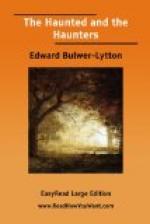She then resumed her knitting, occasionally stopping, as she changed her needles, to listen, with her ear set, as if she wished to augur from the nature of their chirping, whether they came for good or evil. This, however, seemed to be beyond her faculty of translating their language; for after sagely shaking her head two or three times, she knit more busily than before.
At this moment, the shadow of a person passing the house darkened the window opposite which she sat, and immediately a tall female, of a wild dress and aspect, entered the kitchen.
“Gho manhy dhea ghud, a ban chohr! the blessin’ o’ goodness upon you, dacent woman,” said Mrs Sullivan, addressing her in those kindly phrases so peculiar to the Irish language.
Instead of making her any reply, however, the woman, whose eye glistened with a wild depth of meaning, exclaimed in low tones, apparently of much anguish, “Husht, husht, dherum! husht, husht, I say—let me alone—I will do it—will you husht? I will, I say—I will—there now—that’s it—be quiet, an’ I will do it—be quiet!” and as she thus spoke she turned her face back over her left shoulder, as if some invisible being dogged her steps, and stood bending over her.
“Gho manhy dhea ghud, a ban chohr, dherhum areesht! the blessin’ o’ God on you, honest woman, I say again,” said Mrs Sullivan, repeating that sacred form of salutation with which the peasantry address each other. “‘Tis a fine evenin’, honest woman, glory be to Him that sent the same, and amin! If it was cowld, I’d be axin’ you to draw your chair in to the fire; but, any way, won’t you sit down?”
As she ceased speaking the piercing eye of the strange woman became riveted on her with a glare, which, whilst it startled Mrs Sullivan, seemed full of an agony that almost abstracted her from external life. It was not, however, so wholly absorbing as to prevent it from expressing a marked interest, whether for good or evil, in the woman who addressed her so hospitably.
“Husht, now—husht,” she said, as if aside—“husht, won’t you—sure I may speak the thing to her—you said it—there now, husht!” And then fastening her dark eyes on Mrs Sullivan, she smiled bitterly and mysteriously.
“I know you well,” she said, without, however, returning the blessing contained in the usual reply to Mrs Sullivan’s salutation—“I know you well, Mary Sullivan—husht, now, husht—yes, I know you well, and the power of all that you carry about you; but you’d be better than you are—and that’s well enough now—if you had sense to know—ah, ah, ah!—what’s this!” she exclaimed abruptly, with three distinct shrieks, that seemed to be produced by sensations of sharp and piercing agony.
“In the name of goodness, what’s over you, honest woman?” inquired Mrs Sullivan, as she started from her chair, and ran to her in a state of alarm, bordering on terror—“Is it sick you are?”




